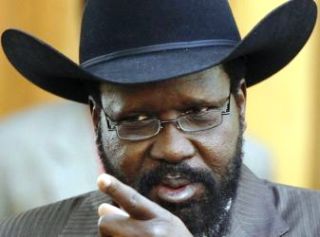South Sudan president plans leaner cabinet
February 9, 2013 (JUBA) – South Sudan’s president Salva Kiir is planning to form a lean, non-partisan and technocratic cabinet in order to save financial resources, a source close to the president told Sudan Tribune on Saturday.

“The president has been consulting with different groups of people, heads of institutions and key officials since he returned from Addis Ababa over how and when the new cabinet should be formed”, the source said.
In August, Kiir formed a technical drafting to conduct an assessment to provide clear findings and recommendations on how to restructure the government.
The highly-placed source told Sudan Tribune that the report had been submitted to the president.
Under the proposed changes the ministries of finance, justice and cabinet affairs will be strengthened, the source said, to “exert their constitutional authority to ensure that ministries, departments and independent commissions and other public institutions implement programmes as mandated and planned.”
The reforms, the source claimed, would enable the government to establish a national monitoring and evaluation policy that would institutionalise management and deliver results across all the government’s activities.
The purpose of the changes is to identify and formulate a way of addressing the embedded inconsistencies, weaknesses, duplications and performance gaps in government, the official said.
The report criticises the government’s past failure to perform vital tasks, such as data validation, review of documents from relevant sectors, analysis of operational and management systems, and building reliable databases for the purposes of monitoring and evaluation.
POWER STRUGGLES
The report hints at the power struggles within the SPLM government that have undermined efficiency in the delivery of public services. It suggests that an evaluation of critical national programmes shows that they have not been effectively carried out because of overlaps between ministries and commissions.
There is evidence, the report says, “to suggest that there has been institutional power struggles at the centre of government, especially between ministry of health and HIV/Aids Commission, between ministry of information and broadcasting and the ministry of telecommunications and postal service, between employee justice chamber and public grievance chamber, between the anti-corruption and the ministry of justice etc.”
“There are a lot of examples to be made,” says the section of the report seen by Sudan Tribune. Officials say the report has not yet been discussed at cabinet level.
The report continues: “In practice, it has been observed that some institutions lack the authority and clout to demand compliance as compared to other institutions such as [the] ministry of finance. The report wants the ministry of justice to be able to draw its authority and act as a head prefect and show example to all other ministries and institutions to ensure effective compliance to performance.”
While the report’s stated aim is to evaluate public spending and improve service delivery, insiders say the move is laced with politics. They see no reason for the move, demanding relocation and scraping of some programmes, arguing that regardless of which ministry a programme is based, it is the role of the office of the president to coordinate and implement them.
The source, quoted the president in a number of high-level and secretive discussions, as saying the move to a technocratic government requires consolidating efforts in order for the move to be backed.
“The government is ready,” said the source, who refused to give the names of the potential new ministers.
The proposed new ministers would have to be approved by South Sudan’s national assembly.
“The practice is that [the] president appoints [his] cabinet and then takes them to the parliament for endorsement. There is a provision in the constitution which gives him such powers. So it is up to him to consult or form the cabinet without consultation”, the official explained.
Lingering rumours about the imminent cabinet reshuffle continues to be the subject of debate on the streets of the capital Juba, with the president’s plan for a technocratic cabinet running into opposition from senior members of his own party.
“Some people have already been approaching us with all kind of complaints that the president is not consulting them about his plans to form the lean government which they hear around. You know also yourself that the public is nowadays loaded with rumours. People are running around passing just with hearsays about [the] reshuffle”, another presidential aide said on Saturday.
(ST)
